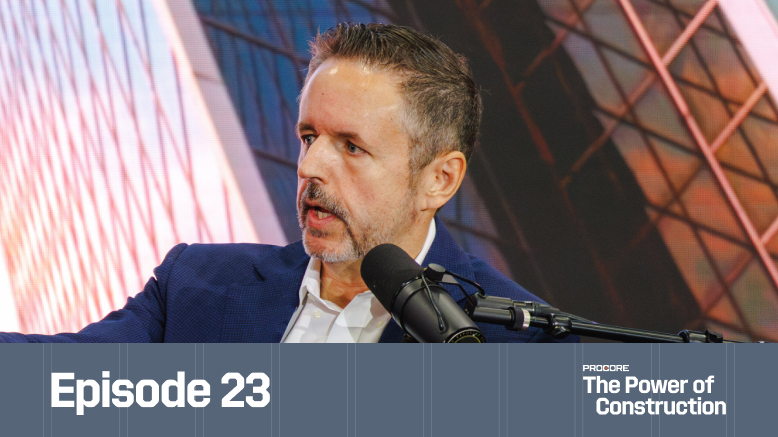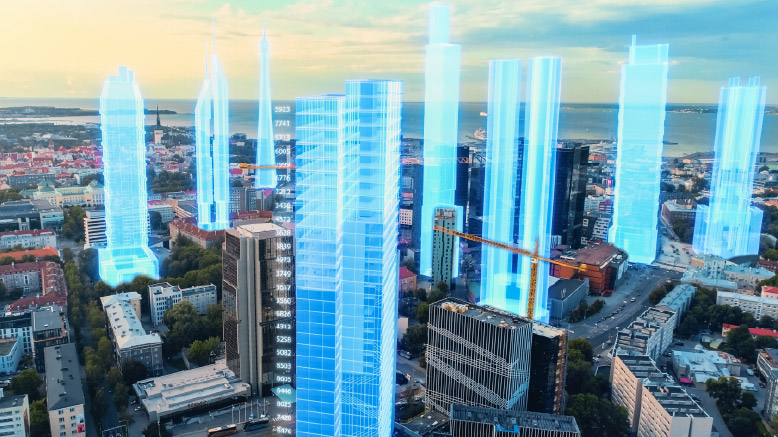— 5 min read
Building Intelligence: How AI & Data Are Rewiring Construction for the Digital Age


Last Updated Sep 23, 2025

Scott Bornman
Principal, Operational Excellence
16 articles
Scott Bornman is a managing strategic product consultant at Procore Technologies. Scott began his long construction career after a successful 8+ years in the U.S. Army, where he selected to be U.S. Army Recruiter following Desert Shield/Desert Storm. Scott has had many roles in the construction field since then, working his way from a project superintendent, to an owner's rep, to a senior project manager and even Vice President of Construction at Bognet Construction and Director of Construction at Plaza Construction before joining the team at Procore.

Marlissa Collier
34 articles
Marlissa Collier is a journalist whose work focuses on the intersections of business, technology, policy and culture. Her work has been featured in digital and print formats with publications such as the Dallas Weekly, XO Necole, NBCU Comcast, the Dallas Nomad, CNBC, Word in Black and Dallas Free Press. Marlissa holds an undergraduate degree in Construction Engineering from California State University, Long Beach and an MBA from Southern Methodist University’s Cox School of Business.
Last Updated Sep 23, 2025

As data center construction surges to meet the demands of AI, cloud computing, weekend streaming binges and real-time digital services, the pressure being put on builders by owners has reached an all-time high. Complex timelines, newly established and ever-evolving regulatory requirements and massive coordination needs have rendered traditional construction workflows out of date.
To keep pace, the industry is undergoing its own transformation — one driven not just by steel and concrete, but by algorithms and data models.
Table of contents
A New Operating System for Construction
Managing the complexity of modern data center projects means navigating a sea of decisions, documents and dependencies. Traditional tools like spreadsheets and Gantt charts can’t always scale to meet this challenge.
The construction of hyperscale data centers is no longer simply about getting the job done — it’s about doing it smarter, faster and with more foresight than ever before. And increasingly, the enablers of that foresight are AI, machine learning (ML) and advanced data analytics platforms.
Construction software integrated with Building Information Modeling (BIM), real-time data analytics and AI is rapidly becoming the industry standard.
These platforms act as centralized command centers — offering real-time visibility into budgets, schedules, subcontractor activity, procurement and more. With the ability to analyze over 250 terabytes of project data monthly, construction teams can uncover patterns, flag risk areas and make data-informed decisions across the entire lifecycle.
It's too complicated. We're not using the tools we have to simplify it. We need to embrace available technologies to streamline the process, and we're currently falling short...AI can manage vast complexities; we just need to program the agents correctly. Companies that embrace 'agentic thinking' and let AI solve or surface problems for them will truly excel.

Scott Bornman
Principal, Operational Excellence
Procore Technologies
For example, advanced platforms can now surface early warning signals: identifying when a subcontractor is falling behind based on delivery logs, or when environmental compliance is at risk due to site-specific variables. According to a McKinsey report, AI tools are helping some firms reduce project delays by up to 20% and cost overruns by 10%, simply by recognizing and responding to issues sooner.
AI That Speaks the Language of Leadership
What makes AI and analytics even more powerful is their ability to be role-specific.
Dashboards tailored for CIOs, CFOs, COOs and project managers provide high-value insights based on their specific metrics of concern.
Digital dashboards can analyze your data right now to tell you precisely which project types, partners and internal teams would yield the greatest profit margins for your company. This doesn't just improve construction; it can fundamentally transform your entire organization.
Scott Bornman
Principal, Operational Excellence
Procore Technologies
For instance, CFOs can track cost trends across similar builds and identify material sourcing inefficiencies. COOs can see schedule bottlenecks and workforce gaps in real-time. CIOs and IT stakeholders can monitor cyber and compliance risks associated with facility commissioning.
This level of operational intelligence allows decision-makers to pivot quickly and ensures that projects align not just with construction KPIs — but with broader business objectives.
Clean Data Is the New Concrete
While AI may be the engine, clean and standardized data is the fuel. For predictive tools to work, data must be entered consistently — whether it’s a change order, incident report, or inspection log. Unfortunately, many construction teams struggle with “dirty data” — inconsistent naming conventions, missing fields or poor documentation practices.
Data hygiene is now a front-line priority. Companies that establish data entry standards, automate field reporting via mobile tools and align teams on taxonomy are laying the groundwork for successful AI integration.
Some firms are taking it a step further, instituting data governance roles within their project teams. These professionals ensure data integrity and act as liaisons between jobsite operations and digital strategy. As predictive analytics becomes more powerful, this function will only grow in importance.
Risk Management Meets Machine Learning
Construction is inherently risky — from labor shortages and weather delays to material price swings and site safety. AI is increasingly being used to predict these risks before they escalate.
For instance, machine learning models can predict the probability of a safety incident based on weather, shift length and crew size.
They can also recommend schedule adjustments based on regional labor trends and analyze past performance of subcontractors to anticipate delays.
You don't need to know everything. Let AI handle the vast amount of information — your SOPs, contracts, drawings and schedules. It can decipher it all for you, knowing how you work, what you're bound to, what to build and when to build it.
Scott Bornman
Principal, Operational Excellence
Procore Technologies
The result? A new era of proactive project management that allows builders to address vulnerabilities long before they show up on a site walkthrough or earnings report.
Free AI in Construction Course with Hugh Seaton
Start learning today with industry expert Hugh Seaton and discover how AI can boost efficiency, reduce risk, and transform your projects.

Cultural Shifts and Digital Readiness
While technology can offer transformative insights, organizational culture often dictates whether adoption succeeds or stalls. Embracing digital tools means shifting mindsets across the org chart — from executives to foremen.
Construction leaders must champion digital fluency, train teams in new systems and incentivize data entry — not as a burden, but as an investment. Some companies have introduced digital mentors or AI liaisons to support change management and upskilling.
Digital readiness is now a competitive differentiator. Builders that adopt early not only gain internal efficiencies but are increasingly preferred partners for tech-forward clients like AWS, Google and Meta—companies that expect transparency, traceability and data-driven execution from day one.
Early adopters of agents, agentic thinking and good data hygiene will be head and shoulders ahead of everyone else.
Scott Bornman
Principal, Operational Excellence
Procore Technologies
BIM + AI: The Future of Intelligent Building
Platforms that combine BIM with AI offer even greater visibility and control. Teams can simulate project outcomes, conduct energy analysis and optimize equipment staging — all before breaking ground. These tools allow developers to fine-tune designs for energy efficiency and cost-effectiveness.
And while no software can replace boots on the ground, BIM platforms can map environmental and operational scenarios that would take weeks of manual planning. This is especially valuable in data center construction, where systems must meet exacting power, cooling and compliance standards.
As the infrastructure that powers the digital world grows in scale and complexity, the tools used to build it must evolve. AI and data analytics are no longer futuristic luxuries—they are essential for navigating the high-stakes, high-speed environment of data center construction.
By embedding intelligence into every phase of the build, construction teams can move faster, reduce risk and create the transparency that modern clients — and regulators — demand. In the digital age, the smartest builder wins.
Was this article helpful?
Thank you for your submission.
100%
0%
You voted that this article was . Was this a mistake? If so, change your vote
Scroll less, learn more about construction.
Subscribe to The Blueprint, Procore’s construction newsletter, to get content from industry experts delivered straight to your inbox.
By clicking this button, you agree to our Privacy Notice and Terms of Service.
Thank you!
You’re signed up to receive The Blueprint newsletter from Procore. You can unsubscribe at any time.
Categories:
AI, BIM, Data Center Construction, Tech and Data, Technology
Written by

Scott Bornman
Principal, Operational Excellence | Procore Technologies
16 articles
Scott Bornman is a managing strategic product consultant at Procore Technologies. Scott began his long construction career after a successful 8+ years in the U.S. Army, where he selected to be U.S. Army Recruiter following Desert Shield/Desert Storm. Scott has had many roles in the construction field since then, working his way from a project superintendent, to an owner's rep, to a senior project manager and even Vice President of Construction at Bognet Construction and Director of Construction at Plaza Construction before joining the team at Procore.
View profile
Marlissa Collier
34 articles
Marlissa Collier is a journalist whose work focuses on the intersections of business, technology, policy and culture. Her work has been featured in digital and print formats with publications such as the Dallas Weekly, XO Necole, NBCU Comcast, the Dallas Nomad, CNBC, Word in Black and Dallas Free Press. Marlissa holds an undergraduate degree in Construction Engineering from California State University, Long Beach and an MBA from Southern Methodist University’s Cox School of Business.
View profileExplore more helpful resources

Who Owns Construction’s Intelligence?
In this episode of The Power of Construction, we chat with Hugh Seaton, CEO of The Link.ai, to step past the buzz around tools and features and unpack what true...

AI With Intent: How Construction Leaders Are Building Trust in Emerging Tech
AI’s potential in construction is enormous — but with this still mostly untapped potential comes an immense amount of risk, that is, if this powerful tool is implemented carelessly. While...

How Close Are We to Bridging the Design-Build Divide?
For decades, construction decisions have often been made based on gut instinct. But what if the real barrier to transformation isn’t technology—it’s the divide between design and construction? In episode...

How AI is Reshaping Decision-Making and Project Resilience in Civil Construction
In construction, the ability to make informed, timely decisions is paramount. No longer is it sufficient to rely solely on historical data or reactive problem-solving. Enter artificial intelligence (AI), a...
Free Tools
Calculators
Use our calculators to estimate the cost of construction materials for your next project.
Templates
Find a template to help you with your construction project tasks.
Material Price Tracker
Get the latest U.S. retail prices and view historical trends for common building materials.
Glossary
Explore key terms and phrases used in the industry.
